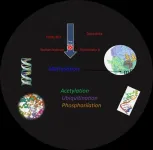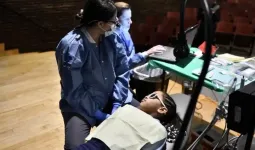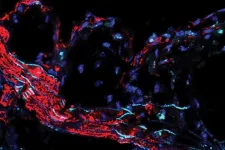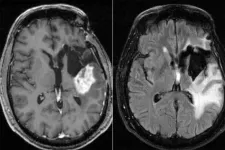Novel pharmacological strategies to treat alcoholism. Focus on epigenetics
This article by Dr. F. David Rodriguez is published in the journal, Current Pharmaceutical Design, 2021
2021-03-31
(Press-News.org) Abusive alcohol drinking considerably impacts human health. Alcoholism, better defined as Alcohol Use Disorders (AUD), includes a group of pathological entities related to alcohol-induced damage. Individuals with AUD exhibit compulsive alcohol drinking and negative emotional states when alcohol drinking ceases. In the most severe AUD forms, the individuals lose control over consumption despite a decided will to stop. Some controversial issues have arisen as to whether the definition of AUD can help to delimit and characterize clinical entities related to abusive alcohol ingestion.
The World Health Organization (WHO) reports that approximately 3,3 million people (5,9% of global deaths) die yearly because of harmful alcohol consumption (According to WHO, as of 4 February 2021, there have been 2,25 million deaths caused by COVID-19, globally). Besides, alcohol is directly responsible for 5 % of disabling diseases and injuries worldwide.
Authorized agencies have officially approved very few pharmacological treatments to treat AUD (for example, disulfiram, opioid antagonists, acamprosate, baclofen, or topiramate). Many patients are reluctant to treatment for different reasons based on their features (age, gender, ethnicity, genetic and epigenetic background) and their alcohol drinking behavior.
Currently, no silver bullet shall rescue humankind from the burden of alcohol on health. Notwithstanding, a better understanding of ethanol's repercussion on molecular cell targets is imperious to plan out pharmacological strategies that ameliorate or block alcohol detriment.
Despite limited favorable results, efforts continue to find drugs acting on causes and effects observed in AUD, including relapse, withdrawal, stress, or anxiety. Nowadays, clinical studies in phases I and II explore the effectiveness of drugs in AUD treatment. Examples of compounds investigated are glutamate and GABA modulators, neuropeptide antagonists, or regulators of neuroimmune responses. Some drugs administered for the treatment of mental disorders have proved efficient in the treatment of AUD. For example, aripiprazole, an antipsychotic drug, and agomelatine, a melatonergic antidepressant, showed beneficial effects by preventing alcohol relapse and craving.
The influence of alcohol on epigenetic mechanisms is a relatively new explored field that offers new avenues for research in the field. The term epigenetics includes chemical changes in DNA, proteins (histones, mainly), mRNAs, and non-coding RNAs with regulatory capacity that control gene expression.
This study provides an in-depth review of recent research that reveals the impact of alcohol on the biochemical mechanisms responsible for epigenetic control within cells. Besides, it analyzes candidate drugs that may counteract the impact of alcohol on epigenetic mechanisms and serve to advance new and tailored pharmacological treatments. Research carried out in animal models and humans (with the obvious ethical limitations imposed on human research) provides valuable information on the epigenetic regulatory processes intercepted by alcohol. The design and laboratory synthesis of new drugs aimed at specific molecular targets offers significant advances in this field.
INFORMATION:
AUDs are chronic and complex diseases that also claim attention, efforts, and study from the realms of psychology, psychiatry, and social sciences.
For more information, visit: https://www.eurekaselect.com/191082/article
[Attachments] See images for this press release:

ELSE PRESS RELEASES FROM THIS DATE:
2021-03-31
New findings from a Michigan Medicine study reveal that antibody testing is predictive of prior COVID-19 infection, and rapid screening methods - even from finger pricks - are effective testing tools.
Researchers analyzed antibody tests conducted on more than 500 subjects in patient care settings. They found that people who had COVID, including those with mild symptoms, produced antibodies.
"For a long time, people were very worried that people with mild COVID did not make immune responses," says Charles Schuler, M.D., a clinical assistant professor of allergy and immunology at Michigan Medicine. "This should give people confidence that the tests that are available to them aren't just random number generators. They're actually giving them ...
2021-03-31
New "sweat stickers" may streamline the early diagnosis of cystic fibrosis by enabling scientists to easily gather and analyze sweat from the skin of infants and children. The stickers matched the performance of previous, more cumbersome devices when tested with 51 subjects, suggesting the stickers could address design obstacles that have held back the diagnosis and treatment of cystic fibrosis in pediatric patients. Diagnosing cystic fibrosis in infancy or childhood is critical to achieve good outcomes, as current treatments must be given early to extend lifespans and alter the course of the disease. Many current diagnostics work by detecting levels of chloride in sweat, which are elevated in cystic fibrosis patients. However, these tests must often be repeated and use unwieldy wrist-wrapped ...
2021-03-31
For many parents, the COVID-19 pandemic has made life's everyday juggling act--managing work, school, extracurricular, and household responsibilities--much, much harder. And according to a new study led by Penn sociologists, those extra burdens have fallen disproportionately on mothers.
The research, shared in the April issue of the journal Gender and Society, investigated how shifts in work and school that arose due to the pandemic triggered changes in the division of labor in families. Using data on two-parent households from a nationwide survey conducted in April 2020, the researchers found that ...
2021-03-31
Scientists from the Skoltech Center for Energy Science and Technology (CEST) have developed a method for modeling the behavior of 2D materials under pressure. The research will help create pressure sensors based on silicene or other 2D materials. The paper was published in the ACS Nano journal.
Silicene, which is regarded as the silicon analog of graphene, is a two-dimensional allotrope of silicon. In its normal state, bulk silicon is a semiconductor with a diamond crystal type structure. As it thins down to one or several layers, its properties change dramatically. However, it has not yet been possible to study the change in the electronic properties of 2D materials at high pressure.
Scientists from Russia, Italy, the United ...
2021-03-31
In a longitudinal study published earlier this month in the Journal of the American Dental Association, researchers analyzed untreated decay in a cohort of nearly 7,000 children enrolled in the ForsythKids preventive dentistry program. Over the course of six years, the percentage of children with untreated cavities in the program decreased from 39 to 19 percent, suggesting that school-based prevention programs are effective in combating childhood dental disease.
Tooth decay is the most common chronic early childhood disease in the United States. More than half of children aged 6-8 years old have had a cavity, and kids from low-income families ...
2021-03-31
High cholesterol is the most commonly understood cause of atherosclerosis, a hardening of the arteries that raises the risk of heart attack and stroke. But now, scientists at Washington University School of Medicine in St. Louis have identified a gene that likely plays a causal role in coronary artery disease independent of cholesterol levels. The gene also likely has roles in related cardiovascular diseases, including high blood pressure and diabetes.
The study appears March 24 in the journal Science Translational Medicine.
Studying mice and genetic data from people, the researchers found ...
2021-03-31
LA JOLLA--(March 31, 2021) Clinicians using a new viral screening test can not only diagnose COVID-19 in a matter of minutes with a portable, pocket-sized machine, but can also simultaneously test for other viruses--like influenza--that might be mistaken for the coronavirus. At the same time, they can sequence the virus, providing valuable information on the spread of COVID-19 mutations and variants. The new test, dubbed NIRVANA, was described online today by a multi-institution team of scientists in the journal Med.
"This is a virus detection and surveillance method that doesn't require an expensive infrastructure like other approaches," says Juan Carlos Izpisua Belmonte, co-corresponding author and a professor in Salk's Gene Expression ...
2021-03-31
AURORA, Colo. (March 31, 2021) - A new study published in Frontiers in Psychiatry finds that patients with Obsessive Compulsive Disorder (OCD) as well as other psychiatric comorbidities, such as autism spectrum or tic disorders, may respond well to Deep Brain Stimulation (DBS).
DBS is a minimally invasive neurosurgical procedure that uses coordinates to target certain areas of the brain, implanting electrodes that can help regulate abnormal brain activity. DBS procedures are rare for OCD in the United States; only a couple hundred patients have received this treatment for OCD management since its FDA approval ...
2021-03-31
An aggressive type of brain cancer, glioblastoma has no cure. Patients survive an average of 15 months after diagnosis, with fewer than 10% of patients surviving longer than five years. While researchers are investigating potential new therapies via ongoing clinical trials, a new study from Washington University in St. Louis suggests that a minor adjustment to the current standard treatment -- giving chemotherapy in the morning rather than the evening -- could add a few months to patients' survival.
The study appears online in the journal Neuro-Oncology Advances.
Average overall survival ...
2021-03-31
AURORA, Colo. (March 30, 2021 - Researchers at the University of Colorado College of Nursing have found that nearly one-quarter of graduate nursing students have reported elevated levels of stress, anxiety and depression, compounded in the past year by the COVID-19 pandemic.
Study findings, published recently in END ...
LAST 30 PRESS RELEASES:
[Press-News.org] Novel pharmacological strategies to treat alcoholism. Focus on epigenetics
This article by Dr. F. David Rodriguez is published in the journal, Current Pharmaceutical Design, 2021





